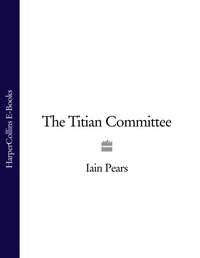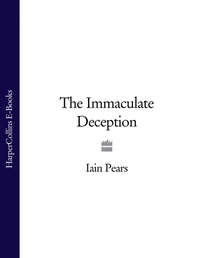
Полная версия
The Last Judgement
‘Did you report this to the French police?’
‘No. There seemed little point and the train was about to leave.’
‘When you make your statement you’d better include these little details. Will you be able to give a description of this man?’
‘I think so, yes. I mean, he was pretty much standard issue. Average height, average weight, brown hair. Two arms and legs. The only sort of distinguishing feature was a small scar here.’
Argyll gestured to a spot above his left eyebrow, and Flavia’s heart sank again.
‘Oh, hell,’ she said again.
‘What?’
‘That sounds like the man seen trying to visit Muller yesterday.’
Bottando sighed. That’s what comes of trying to protect boyfriends. ‘So it seems we must at least entertain the possibility that you are going to receive a visit from a murderer. What time is he coming?’
‘Five, he said.’
‘In which case we should be there to meet him. And take no chances, either. If he’s a killer, he’s a nasty one. This picture is still at the auction house, you say?’
Argyll nodded.
‘It can’t stay there. Flavia, get Paolo to go down and get it. Put it in the strongroom downstairs until we decide what to do with it. Then get hold of Fabriano. A couple of armed men in the street, and another in the apartment should be enough. Discreet, eh? Make sure he understands that. When we’ve got hold of him, we can decide what to do next. Assuming he turns up, of course. Perhaps if we deliver a murderer we might skate over everything else.’
6
Such a simple scenario turned out to be too much to hope for. They waited an hour in the small apartment and received no visitors at all. Not even Fabriano, although to Flavia’s mind that was no bad thing. They had to make do with one of their own regular policemen who reluctantly admitted to knowing what end of a gun to point at a suspect; Fabriano was out on a case, so the Carabinieri said.
‘When is he coming back, then?’ she asked the man who answered. ‘This is important.’
He didn’t know. ‘Can you patch me through to his radio?’ she asked impatiently.
‘Patch you through?’ came the mocking response. ‘What do you think we are? The US Army? We’re lucky if we can get the things to work at all.’
‘Well, get a message to him, then. It’s urgent. He’s to come to my apartment as quickly as possible.’
‘You two getting back together again?’
‘Do you mind?’
‘Sorry. OK. I’ll see what I can do,’ said the voice from the other end. Somehow, he didn’t inspire confidence.
If this demonstration of planning skill was less than impressive, at least Bottando had managed to get through to Janet, who informed him that he had absolutely none of his people in Italy.
‘Taddeo,’ came the booming voice down the phone, ‘How could you think such a thing? Would I do something like that?’
‘Just checking,’ Bottando reassured him. ‘We must do things properly. Now, tell me about this painting. Is it stolen?’
Janet said that he didn’t know. He’d have to look it up. He’d ring back with the information as soon as possible.
‘And now we wait,’ said Bottando. He looked around the apartment. ‘Charming place you have here, Flavia.’
‘You mean it’s untidy and minuscule and bleak,’ Argyll said. ‘I quite agree. Personally I think that we should move.’
If he had hoped for support from Bottando, though, Argyll was disappointed. Not that the General didn’t agree, but the ringing of the doorbell prevented him from saying so. An expectant hush fell. Argyll turned pale, the uniformed policeman took out his gun and looked at it unhappily, Bottando went and hid in the bedroom. Unfair, in Argyll’s view. He’d been planning to hide in there himself.
‘OK, then,’ Flavia whispered. ‘Open the door.’
And gingerly, expecting to be attacked at any moment, Argyll edged towards it, unlocked it, and retreated back out of the line of fire. The policeman waved his gun around, looking nervous. It occurred to Flavia that she hadn’t actually asked if he’d ever fired one before.
There was a pause from outside, then the door swung slowly open, and a man stepped in.
‘Oh, it’s you,’ Flavia said with relief and disappointment.
Fabriano, still framed by the doorway, looked at her with irritation. ‘Don’t sound so pleased. Who were you expecting?’
‘You didn’t get my message, either?’
‘What message?’
‘One of those days,’ she said as she explained.
‘Oh. I see.’ He waggled his little radio. ‘Batteries flat,’ he explained. ‘What was it about?’
Flavia provided a brief summary. Edited version only. Some aspects of the story were covered a little fast. By the end, she’d given the impression that her relationship with Argyll was based on mutual lack of communication.
‘This man’s a bit late, isn’t be?’ Fabriano said.
‘Yes.’
‘Perhaps because he was busy doing other things.’ Fabriano had that ‘I know something that you don’t’ look on his face.
She sighed. ‘Well? Like what?’
‘Like committing another murder, perhaps.’ Fabriano went on. ‘Of a harmless Swiss tourist. Who just happened to have Muller’s and your addresses written on a piece of paper in his pocket.’
He explained that he’d been called out at four to the Hotel Raphael, a quiet, pleasant hotel near the Piazza Navona. A hushed and shocked manager had called to report what he said was a suicide in one of the rooms. Fabriano had duly gone along. Not a suicide, he said. That was wishful thinking on the part of the manager. There was no way the dead man could have shot himself like that. Not with the gun wiped clean of fingerprints, anyway.
‘I’m afraid, my dear, that you are going to have to look at this hotel room,’ Bottando said. ‘I know you don’t like bodies, but still …’
She agreed reluctantly, noting as she prepared to go that Bottando himself had slithered out of it. He thought he ought to go back to the office. People to telephone, he said.
Argyll wasn’t so lucky. Not only did he have no desire to see this scene, he’d taken something of a dislike to Fabriano as well; largely because Fabriano had so obviously taken a dislike to him, admittedly, and he had this strong feeling it would be best to steer well clear. However, Fabriano, after eyeing him with a slight sneer of contempt around his upper lip for a few seconds, said he wanted a statement, so he’d better come too. They could deal with him later.
Flavia had described her morning in Muller’s apartment and, even though she had spared him most of the worst, he had a sufficiently agile imagination to be apprehensive long before they reached the third floor room in the hotel. Fabriano, of course, was laying it on thick; so much so that, when he did finally walk into room 308, he was almost disappointed, and certainly relieved. If there were individual styles in murder, then this was one that had not been committed by the person who killed Muller.
Instead of chaotic devastation this particular scene of crime was almost domestic. The occupant’s clothes were still laid out in neat piles on the table; a newspaper lay neatly folded on top of the television. His shoes were lined up and poking out from underneath the bed, which had been turned down evenly and with care.
Even the body itself conformed to this pattern. Surprisingly, there was no horror; even Argyll found it impossible to feel sick. The victim was fairly old, but evidently well preserved; even dead – a state which rarely brings out the best in people – he looked only in his sixties. His passport, however, suggested he was seventy-one, with the name of Ellman. The bullet that had killed him had done so through a neat, round hole, perfectly and symmetrically placed at the top of his bald and shiny head. There was not even much blood to get the stomach-heaves about.
Fabriano grunted when Flavia noted this, and pointed to yet another of the inevitable plastic bags lying in the corner of the room. It was green. With quite a lot of red.
‘Odd thing,’ he said. ‘As far as we can make out, the victim was sitting in the chair. His killer must have come up behind him’ – here he approached the chair from the rear to illustrate the point – ‘put the towel around his head and shot. Right through the top of the head. The bullet went straight down; no exit wound at all, that we can find. It must have gone straight down his neck and ended up near his stomach. I suppose we’ll find it eventually. So, not much mess. And as the gun had a silencer, not much noise either. Do you know this man as well, Argyll? Been selling pictures to him, too, by any chance?’
‘No, I’ve never seen him before,’ Argyll said, peering at the sight with an odd interest. He decided to ignore the less than courteous way Fabriano chose to address him. ‘He rings no bells at all. Are you sure he wasn’t the one who telephoned me?’
‘How should I know?’
‘So what was he doing with my address? Or Muller’s?’
‘I don’t know that, either,’ he replied a little testily.
‘What about his movements? Where does he come from?’
‘Basle. Swiss. Anything else I can tell you? To help you with your enquiries?’
‘Shut up Giulio,’ Flavia said. ‘You brought him here. The least you can do is be polite.’
‘Anyway,’ Fabriano continued, manifestly irritated at having to waste time explaining things to hangers-on, ‘he arrived yesterday afternoon, went out in the evening, came back late and after breakfast spent the rest of his life in his room. He was found just after four.’
‘And Jonathan was rung up at about two,’ Flavia said. ‘Is there a record of any calls?’
‘No,’ said Fabriano. ‘He made no outside calls. Of course, he may have used the public phone in the lobby. But no one saw him leave his room.’
‘Visitors?’
‘No one asked for him at the desk, no one noticed any visitors. We’re interviewing the staff and the people in neighbouring rooms.’
‘So there’s no reason to think either that he had anything to do with the death of Muller, or with this painting.’
‘The addresses, and the gun which is the same type as the one used to dispatch Muller. Apart from that, no. But it’s not bad as a beginning. Although perhaps an élite specialist like yourself has some better idea?’
‘Well …’ began Flavia.
‘And besides, I’m not really interested in what you think. You are here to assist me, when I ask for your assistance. And your friend here is a witness, nothing more. Understood?’
Argyll watched Fabriano’s performance with interest. What on earth had Flavia ever seen in this man? he thought huffily. He had a feeling Fabriano was thinking pretty much the same sort of thing.
‘You don’t know who killed him, though, do you?’ Flavia went on. ‘Or why? Or what this picture’s got to do with it? In fact, you don’t know much at all.’
‘We will. This isn’t going to be so difficult. Not when we work on it a bit,’ Fabriano said confidently.
‘Hmmph,’ Argyll commented from the corner of the room. Not, perhaps, the cutting repartee he would ideally have liked, but all he could think of. Somehow being browbeaten made him dry up. A weakness, and one he had never admired in himself.
And there they all were, standing around, getting on each other’s nerves. And not even accomplishing anything. Flavia decided she had better take the initiative. She would deal with Argyll’s statement about the picture. If Fabriano wanted anything more, he could ask tomorrow. It was evident from the look in Fabriano’s eye that he would do a good deal more than ask. But that, at least, had been postponed. So she ushered Argyll out, and suggested that Fabriano get on with whatever it was he was meant to do. She would send him round a copy of the interview when it was done.
They left to the sound of Fabriano calling down the corridor that he would call and collect it himself. And not to think he wouldn’t be asking supplementary questions. Lots of them.
Too much crime was making Flavia a bit callous; for some reason the evening’s events had put her in an exceptionally good mood. No more mucking about with minor thefts of gilt cups from churches, or trotting about interviewing petty thieves about disappearing jewellery. No. For the first time in several months, she had something half-way decent to have a go at.
She had, in fact, been hard-pressed to stop herself humming cheerfully as she and Argyll had sat in her office, taking down a detailed statement about his role in the affair. But she was professional enough to make Argyll a little unnerved; he had not had the busy police side of her directed at him for many years and had forgotten how intimidating she could be behind a typewriter. It was the little details that bothered him; having to give her, of all people, his passport number, and recite his date of birth and address.
‘But you know my address,’ he pointed out. ‘It’s the same as yours.’
‘Yes, but you have to tell me. This is an official statement. Would you rather dictate it to Fabriano?’
‘Oh, very well,’ he sighed and gave the information. Then there was the long process of going through the statement, his words being knocked into bureaucratically approved shape with her help. So he paid a business call on J. Delorme, picture dealer, rather than saw him; proceeded to the railway station to make his way back to Rome instead of heading for the station to catch a train. Had aforementioned person unknown attempt to abscond with said painting rather than was nearly suckered by a crook.
‘So you then caught the train and travelled straight back to Rome. And that’s it?’
‘Yes.’
‘I do wish you’d reported it to the French police. Life would have been much easier.’
‘It would have been much easier if I’d never seen it in the first place.’
‘True.’
‘At the very least I would never have come across this Fabriano creature. What did you ever see in him?’
‘Giulio? He’s not so bad, really,’ she said absently. Why she was defending him temporarily escaped her. ‘In a good mood he’s fun, lively and quite good company. He tends to be a bit possessive, mind you.’
Argyll produced one of his non-committal grunts; the sort that indicated that he could scarcely disagree more profoundly.
‘Anyway,’ she went on, ‘we’re not here to talk about my youth. I must retype this thing. Keep quiet for a few minutes while I do it.’
So Argyll fidgeted and looked bored while she put the finishing touches to her work, tongue between her teeth, frowning slightly, intent on making as few errors as possible.
‘Now in Rome …’ she went on. And so the enterprise continued, for nearly an hour until she had it down to her satisfaction. Eventually, she leant back, took the piece of paper out of the machine and handed it to him.
‘Read this, assure yourself it’s a full and accurate account,’ she said formally. ‘Then sign it, whatever you think. I’m not going to retype it.’
He gave her a grimace, and read it over. There were bits missing, of course, but in his judgement they were scarcely relevant. Full and accurate seemed to be the right description. He put his mark on the dotted line and handed it back.
‘Pouf. Thank God that’s over,’ she said with relief. ‘Splendid. Didn’t take long at all.’
‘How long does it normally take?’ he asked, looking at his watch. It was nearly ten o’clock, they’d been cooped up for over two hours and he was getting hungry.
‘Oh, hours and hours. You’d be surprised. Come on, let’s go and see Bottando. He’s waiting for us.’
He was waiting patiently and placidly, staring at the ceiling, with a pile of miscellaneous papers spread over his desk. His initial instinct when Fabriano had turned up had been to rush off himself and take on the department’s end of the investigation. Reason, however, intervened. This was a Carabinieri matter and, much as he wanted to get involved, it would never do for someone as senior as himself in the rival Polizia to end up as the virtual assistant of a mere detective. So Flavia would have to do that bit. He was a bit uneasy about her clear personal involvement; hence his desire to find out as quickly as possible in her absence about Argyll’s picture. If it was stolen and he, in effect, had smuggled it out of France, the matter would be clear; whoever took on the investigation it could not possibly be her. Think of the headlines in the papers. Think of the disapproving frowns on the faces of superiors. Think of the pleasure of his assorted rivals in making sure everybody knew that he had sanctioned the investigation of a series of linked offences by an officer who was the girlfriend of one of the felons.
On the other hand, the problem was how to stop Flavia investigating. What could he say? If he gave the case to someone else her reaction would be predictable and none too agreeable. If he did give it to her …
A conundrum. An ambiguity in the universe, and Bottando didn’t like imponderables. He was thus even more irritated and perplexed when the long-awaited phone call from Paris came through and, despite his hopes, muddied the waters still further.
Was the picture stolen or not? A straightforward question, surely, and one that should produce a straightforward answer. Like yes. Or no. Either would do. What he did not anticipate, or approve of, was Janet’s response.
‘Maybe,’ the Frenchman said.
‘What do you mean? What sort of answer is that?’
There was the uncomfortable sound of Janet clearing his throat at the other end. ‘Not a very good one. I have been trying my best, but not with a great deal of success. We did have a note from the police proper notifying us that a picture of this description had been stolen.’
‘Ah. There we are, then,’ said Bottando, clutching at the information.
‘I’m afraid not,’ Janet replied. ‘You see, we were then told that no action by our department was required.’
‘Why not?’
‘That’s the problem, isn’t it? It means either that it has already been recovered, or that it’s too unimportant to bother about, or that the police investigating know what happened and don’t require our special skills.’
‘I see,’ Bottando said, not at all sure that he did. ‘So what, exactly, is the status of this picture that is leaning against my desk? Does it have a right to be here or not?’
Can you give a perfectly honed and practised Gallic shrug down a telephone? Perhaps you can. Bottando could almost see his colleague delivering a masterly demonstration of the art.
‘Officially, this painting has not been notified to us as stolen, so as far as we’re concerned it hasn’t been stolen. We have no interest in it. That’s all I can say at the moment.’
‘You couldn’t do something simple and ask the owner?’
‘If I knew who the owner was, I could. But that is one of the little details that we were not given. To be on the safe side, it would be best if Mr Argyll brought it back, but I’m not in a position to say whether we have a right to it or not.’
And that was that. How very intriguing. No further on at all, Bottando put the phone down and thought. Damn picture, was all he came up with. And odd Janet. Normally the most effusive of people, but this time he had not gone out of his way to help. Normally, with any sort of request, the man swamped them with details. Usually he would put somebody on to it to dig up everything he could. But not this time. Why not? Perhaps he was just busy. Bottando knew the problem. Priorities. If you are really strapped, you can’t waste too much time on minor stuff. But still …
Then he went and sat on his armchair, cupped his chin in his hands and looked carefully at the painting. As Flavia had said, it was decent enough, quite well done, in fact. If you like that sort of thing. But nothing special. Nothing to kill for, not that they had any real reason to think that it had been anything other than an innocent bystander, so to speak. Besides, since it had arrived in the department a couple of hours previously, a specialist from the National Museum had been summoned to examine it carefully, and concluded that it was exactly as it seemed. Nothing underneath the paint, and nothing behind the canvas and nothing hidden in the frame. Bottando sometimes had a vivid imagination in this regard. Many years ago he had caught some drug-smugglers shipping heroin hidden in holes drilled in a picture-frame, and he dearly wanted to catch someone at it again. Not in this case; despite all efforts it was resolutely still just a middling picture in an ordinary frame.
He was still looking and shaking his head when Flavia and Argyll came in.
‘So? What is there to report?’
‘Quite a lot, really,’ she said as she sat down. ‘This man Ellman was probably shot with the same gun that killed Muller. And you already know that he had both Muller’s and Jonathan’s numbers and addresses in his book.’
‘What about this mysterious character with the scar? No chance he was seen wandering around the lobby?’
‘’Fraid not.’
‘Who was he? Ellman, I mean.’
‘According to the documentation he had on him, he was German, naturalized Swiss. Lived in Basle, born 1921, and a retired import – export consultant. What that is I don’t know. Fabriano is contacting the Swiss to find out more.’
‘So, we are in the position of having information without explanation.’
‘That’s about right. Still, we can play around with some ideas.’
‘If we must,’ Bottando said dubiously. He disliked playing around with ideas. He preferred ordering facts. More professional.
‘OK, then. Three events: an attempted theft and two murders, combined with the possibility that the picture was stolen. First thing we have to do is find out who the last owner was.’
‘Which Janet says he doesn’t know.’
‘Hmm. Anyway. All these events are linked. The picture and the man with the scar link the first two; the gun links the second and third. Muller is tortured, and unless his killer was mad, that can only have been to find something out. His pictures were cut up into pieces, and afterwards someone phones Jonathan asking about Socrates.’
‘Yes,’ said Bottando patiently. ‘So?’
‘So nothing, really,’ she said, a little crestfallen.
‘There is also another little question,’ Argyll said. If the whole business was going to be complicated he didn’t see why he shouldn’t put in his contribution as well.
‘And that is?’
‘How did this man know about Muller? And how did he know I was going to be at the railway station in Paris? I didn’t tell anyone. So the information must have come through Delorme.’
‘We will have to ask this colleague of yours,’ Bottando said. ‘And do quite a lot of other work as well. Muller’s sister arrives tomorrow, I gather. And someone will have to go to Basle.’
‘I can go after I’ve seen the sister,’ Flavia said.
‘I’m afraid not.’
‘Why not?’
‘Ethics,’ he said ponderously. ‘That’s why.’
‘Just a second –’
‘No. You listen. You know as well as I do that you really ought to take a low profile in this matter. However unwittingly Mr Argyll here may have been handling stolen goods, none the less that is what he may well have been doing. He is also a major witness and you concealed that from the Carabinieri.’
‘That’s overdoing it a bit.’
‘I am merely stating what it would look like in the hands of someone like Fabriano. You cannot be seen to be involved in the investigation.’
‘But –’
‘Be seen to be involved, I said. There is also another problem, which is that, for the first time in our acquaintance, brother Janet is not being entirely frank with me – and until I know why, we will have to proceed with some caution.’
‘What do you mean?’
‘He said that it would be best if Mr Argyll brought the picture back.’
‘So?’
‘I never told him Mr Argyll had the picture. Which leads me to suspect that maybe there was a Frenchman working here without official notice. Which I don’t like. Now, Janet never does anything without a good reason; so we have to try and work out what that reason is. I could ask, but he’s already had the opportunity to tell me, if he was so minded.’







